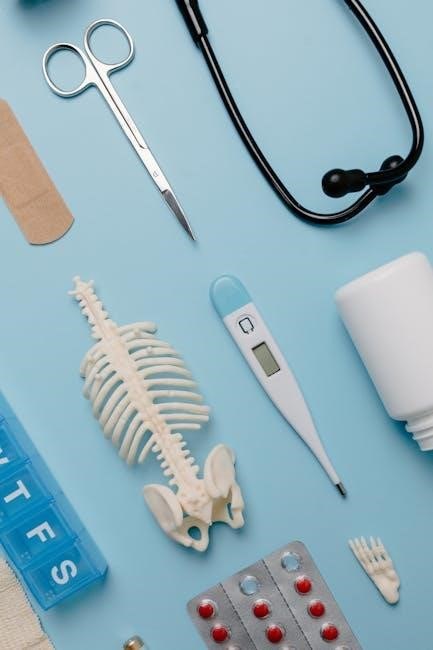medication aide study guide

This guide provides essential tools and resources for aspiring medication aides, offering practice questions, exam strategies, and comprehensive reviews to ensure successful certification and professional competence.
1.1 Overview of the Medication Aide Role
A medication aide plays a vital role in healthcare, assisting with medication administration in settings like long-term care facilities. Their responsibilities include accurately administering medications, maintaining records, and ensuring safety protocols. Proper training and certification are essential to perform these tasks effectively. The role requires strong communication skills, attention to detail, and a commitment to patient well-being. Medication aides work under supervision, ensuring medications are given correctly and safely, which is critical for patient health and facility compliance.
1.2 Importance of Proper Medication Administration
Proper medication administration ensures patient safety, prevents adverse reactions, and maximizes therapeutic benefits. Accurate dosing, timing, and documentation are critical to avoid errors. Medication aides must adhere to protocols to prevent harm, improve health outcomes, and maintain trust in care settings. Correct administration also reduces legal risks and promotes efficient care delivery, making it a cornerstone of healthcare quality and patient-centered practice.

Key Concepts and Definitions
This section covers essential medication terminology, classifications, and definitions, providing a solid foundation for understanding medication administration principles and ensuring safe, effective drug delivery practices.
2.1 Medication Terminology
Understanding medication terminology is crucial for effective communication and safe drug administration. Key terms include administer (to give medication), controlled substance (drugs with potential for abuse), and dispense (issuing medication). Familiarity with terms like PRN (as needed), dosage (amount to take), and route (method of administration) ensures clarity. This section defines essential vocabulary, enabling accurate understanding and application in clinical settings, while adhering to legal and professional standards for medication administration. Clear terminology promotes patient safety and effective care delivery.
2.2 Common Medications and Their Uses
Understanding common medications is vital for safe administration. Antihypertensives, like ACE inhibitors, manage blood pressure. Antidiabetics, such as Metformin, regulate blood sugar. Analgesics, including acetaminophen, relieve pain. Anticoagulants, like warfarin, prevent blood clots. Familiarity with these drugs ensures proper administration and patient safety, aligning with legal and professional standards. This section provides a foundational knowledge of key medications, enhancing the ability to administer them accurately and effectively in clinical settings, while promoting patient well-being and adherence to care protocols.
Certification Process
The certification process involves structured training, meeting specific requirements, and passing a standardized exam to ensure competence in medication administration, supported by practice materials for thorough preparation.
3.1 Requirements for Becoming a Certified Medication Aide
Becoming a certified medication aide requires completing a state-approved training program, passing a competency exam, and meeting specific eligibility criteria. Candidates must also undergo background checks and fulfill continuing education requirements to maintain certification. Additionally, many states mandate in-service training hours and adherence to specific guidelines to ensure competence in medication administration.
3.2 Exam Format and Content
The certification exam typically includes multiple-choice questions that assess knowledge of medication administration, safety protocols, and legal responsibilities. The content covers dosage calculations, medication types, and patient-specific considerations. Additionally, the exam may include scenario-based questions to evaluate practical application of skills. Candidates are encouraged to use practice exams and study guides to familiarize themselves with the format and content, ensuring readiness for the certification assessment.

Medication Administration Techniques
This section covers proper techniques for administering medications, focusing on accurate dosage, timing, and handling of various medication types to ensure safe and effective administration.
4.1 Proper Dosage and Timing
Accurate dosage and timing are critical for safe medication administration. Medication aides must measure doses precisely, adhering to prescribed schedules and PRN orders. Proper timing ensures therapeutic effectiveness and minimizes side effects. Tools like medication carts and digital systems help track administration. Consistent record-keeping is essential for accountability and continuity of care. Understanding dosage calculations and conversion methods is vital. Always double-check orders and consult guidelines if unsure. Proper techniques ensure patient safety and optimal treatment outcomes. Regular training and practice reinforce these essential skills for medication aides.
4.2 Handling Different Types of Medications
Medication aides must handle various forms of medications, including oral, topical, injectable, and inhaled types. Proper storage and disposal are critical for safety and efficacy. Controlled substances require special documentation and secure storage. Always follow manufacturer guidelines for preparation and administration. Use personal protective equipment when handling hazardous drugs. Label medications clearly to prevent mix-ups. Proper handling ensures patient safety and compliance with legal standards. Regular training on new or complex medications is essential for maintaining competence and avoiding errors.
Safety and Legal Considerations
Safety protocols and legal compliance are critical in medication administration. Accurate documentation, proper storage, and adherence to regulations minimize errors, protecting both patients and professionals from legal risks.
5.1 Avoiding Medication Errors
Avoiding medication errors requires meticulous attention to detail, accurate documentation, and proper verification of orders. Ensuring the right medication, dose, and administration time is crucial. Double-checking prescriptions, using barcode scanning, and maintaining clear communication with healthcare teams can significantly reduce risks. Proper storage and handling of medications also prevent contamination or mix-ups. Understanding drug interactions and patient allergies is vital to avoid adverse reactions. Regular training and adherence to safety protocols further minimize errors, ensuring patient safety and legal compliance.
5.2 Legal Responsibilities of a Medication Aide
Medication aides must adhere to legal standards, ensuring safe and accurate medication administration. They are required to follow employer policies, state regulations, and federal laws. Proper documentation of administered medications is mandatory to maintain accountability. Aides must also respect patient confidentiality and avoid unauthorized disclosure of medical information. Understanding liability limitations and reporting errors promptly are critical to upholding legal and ethical standards. Certification and ongoing training ensure compliance with legal responsibilities, protecting both patients and professionals.
Study Tips and Strategies
Effective learning techniques include creating a study schedule, using flashcards for medication terminology, and practicing with sample questions. Time management is crucial for exam preparation, focusing on weak areas and reviewing key concepts regularly. Utilize online resources and study guides to reinforce knowledge and build confidence. Active learning strategies, such as group discussions and self-quizzing, enhance retention and understanding of medication administration principles.
6.1 Effective Learning Techniques
Effective learning techniques involve active engagement with study materials. Create a study schedule, breaking material into manageable sections. Use flashcards to memorize medication terminology and dosages. Practice with sample questions to familiarize yourself with exam formats. Review key concepts regularly, focusing on areas where improvement is needed. Engage in group discussions or teach the material to others to reinforce understanding. Utilize online resources and study guides for additional practice. Regular self-assessment helps identify weaknesses and track progress. Consistency and organization are key to mastering the content efficiently.
6.2 Time Management for Exam Preparation
Effective time management is crucial for successful exam preparation. Create a detailed study plan, allocating specific time slots for each topic. Prioritize challenging areas and dedicate extra time to them. Use a timer during practice sessions to simulate exam conditions, improving speed and accuracy. Break study sessions into shorter intervals with breaks to maintain focus. Regularly review and adjust your schedule to ensure all material is covered. Avoid cramming by spreading study sessions evenly across the preparation period. Stay organized and track your progress to stay motivated and confident.

Practice Questions and Exam Review
This section provides sample questions and detailed answers to help you assess your knowledge. Regular practice with these questions improves understanding and exam readiness effectively.
7.1 Sample Questions and Answers
This section includes multiple-choice questions covering essential topics like medication administration, dosage calculations, and side effects. Each question is followed by a detailed answer and rationale to enhance understanding. For example:
“What is the primary purpose of verifying a resident’s identity before administering medication?”
Correct answer: “To ensure patient safety and prevent medication errors.”
These questions simulate real exam scenarios, helping you identify knowledge gaps and improve retention. Regular practice with these questions will boost your confidence and exam readiness.
7.2 Strategies for Passing the Certification Exam
Develop a structured study plan, focusing on weak areas identified through practice questions. Prioritize understanding medication administration principles, dosage calculations, and legal responsibilities; Review error-prone topics like controlled substances and PRN medications. Utilize active learning techniques such as flashcards and concept mapping to reinforce knowledge. Practice under timed conditions to build exam stamina. Stay calm and read questions carefully to avoid mistakes. Regularly review and analyze incorrect answers to improve comprehension and retention. Consistent effort and strategic preparation are key to achieving certification success.

Resources and References
Utilize recommended study materials like Hartman’s Complete Guide and Medication Study Guide 2025 for comprehensive preparation. These resources offer detailed insights and practice questions to enhance understanding.
Explore online tools such as Quizlet flashcards and practice exams to reinforce learning. These resources provide interactive and accessible ways to master medication administration concepts effectively.
8.1 Recommended Study Materials
Key resources include the CERTIFIED MEDICATION AIDE STUDY GUIDE 2025-2026, offering 260 practice questions and a 28-day learning plan. The Medication Technician Study Guide is another valuable tool, providing detailed training manuals. Additionally, Hartman’s Complete Guide for the Medication Aide ensures mastery of administration skills. Online platforms like Quizlet and practice exams are also recommended for interactive learning. These materials are designed to enhance knowledge retention and exam readiness, ensuring comprehensive preparation for certification.
8.2 Online Tools for Medication Aide Preparation
Leverage online tools like Quizlet for flashcards and practice questions, or YouTube videos offering exam prep insights. Websites with sample exams, such as those from the Texas Department of Aging and Disability Services, provide realistic practice. Online platforms also offer interactive study guides, scenario-based learning, and forums for peer support. These resources enhance understanding and confidence, ensuring thorough preparation for the certification exam.
Continuing Education and Professional Development
Continuing education is crucial for medication aides to maintain certification and stay updated on medical advancements. Regular training ensures compliance with evolving healthcare standards and patient safety.
9.1 Ongoing Training Requirements
Medication aides must complete ongoing training to maintain certification and stay updated on medical advancements. Annual requirements include 16 hours of in-service training or education focused on medication administration, patient safety, and legal responsibilities. This ensures continuous skill development and adherence to evolving healthcare standards, enabling aides to provide high-quality care and adapt to new protocols effectively.
9.2 Staying Updated on Medication Advances
Staying informed about new medications, dosages, and administration guidelines is crucial for medication aides. Utilizing updated study guides, online platforms, and professional resources ensures awareness of the latest drug developments. Regular reviews of clinical guidelines and manufacturer updates help prevent errors and enhance patient care. Continuous education fosters competence and adaptability in a rapidly evolving healthcare environment, ensuring safe and effective medication administration practices.
Final Exam Preparation
Thoroughly review key topics, practice with sample questions, and implement effective test-taking strategies to build confidence and ensure readiness for the certification exam.
10.1 Reviewing Key Topics
Focus on understanding the medication aide role, dosage calculations, and legal responsibilities. Practice with sample questions to reinforce knowledge of administration techniques and safety protocols. Reviewing flashcards and study guides helps identify weak areas, ensuring comprehensive preparation. Prioritize topics like medication terminology, common drugs, and error prevention. Use a well-organized study plan to master challenging subjects and build confidence for the exam.
10.2 Managing Exam Day Stress
Effective stress management on exam day is crucial for optimal performance. Practice deep breathing exercises and arrive early to familiarize yourself with the environment. Stay positive and avoid last-minute cramming. Review flashcards or practice questions to boost confidence. Focus on reading each question carefully and pacing yourself. Remember, adequate preparation reduces anxiety. Stay hydrated, eat a nutritious meal, and maintain a calm mindset. These strategies will help you approach the exam with clarity and confidence, ensuring your best performance.



Leave a Reply
You must be logged in to post a comment.